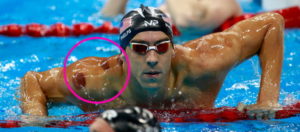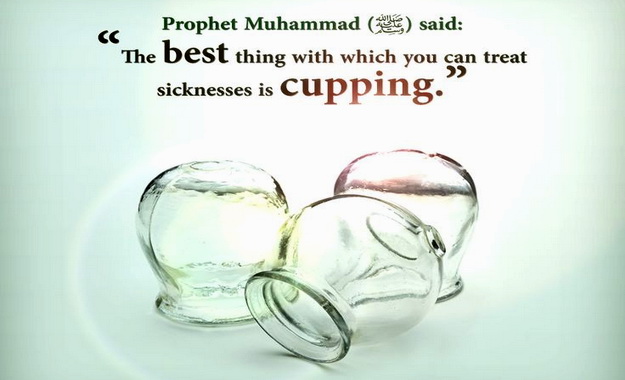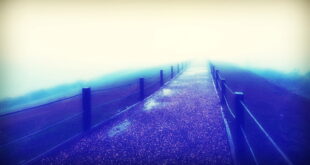 The Olympics 2016 in Rio had many people curiously talking about red marks seen on athletes such as US swimmer Michael Phelps’s, Gymnast Alex Naddour and others. These red marks were caused by cupping.
The Olympics 2016 in Rio had many people curiously talking about red marks seen on athletes such as US swimmer Michael Phelps’s, Gymnast Alex Naddour and others. These red marks were caused by cupping.
This was not too surprising to Muslims though. It has been a tradition of the Prophet Muhammad (Sallallahu alayhi wassallam), who practiced it and recommended it more than 1400 years ago.
Anas ibn Maalik (radhiAllaahu anhu) reported that the Messenger (Sallallahu alayhi wassallam) said, “Indeed the best of remedies you have is cupping (hijama)…” [Bukhari]
Hijama – “sucking” is the Arabic term for wet cupping, where blood is drawn by vacuum from a small skin incision for therapeutic purposes.
There is also a ‘dry cupping’ which does not draw out the blood. Some use it for massaging; using olive oil in order to make easy movement of the cups.
In hijama therapy, the pain is minimal, like a prick, but then again it depends on what hurts you and what does not! However, this is a great Sunnah and benefits your body a lot. So do not lose out.
The medical benefits from this Sunnah are aplenty like and the therapy helps treat the following conditions: fatigue, period pain, constipation and diarrhea, headaches, back pain, arthritis, injuries, asthma, anaemia, depression and emotional problems, atrophy, sciatica, common cold and flu, skin problems, emotional problems, depression and much more.
Benefits related to Hijama (Cupping)
Shaykh ul-Islaam Ibn Taymiyyah (d.728) –Rahimullaah– after speaking about the Neeyah (intention) and purpose, says that they are from the actions of the heart and it is a must to follow the Messenger (Sallallahu alayhi wassallam) with regard to intention and purpose:
From this issue is that when the Prophet (Sallallahu alayhi wassallam) had Hijama performed upon him and ordered others to have Hijama performed upon them, he said in an authentic hadeeth: “Cure/treatment for my Ummah is in the incision made by the one who performs Hijama, by drinking honey or cauterization but I do not like to be cauterized.” [Bukhari]
It was well-known that the purpose of Hijama was to extract blood which is harmful to the body.
Hijama is mentioned because in hot countries blood rises to the surface of the body and so Hijama removes that blood. This is why Hijama is performed in the Hijaaz (the western provinces of Saudi Arabia) and in other similar hot countries because the intended aim of extracting blood is achieved with the Hijama.
As for cold countries, the blood seeps into the veins and so the vein needs to be cut by performing venesection (opening/dissecting a vein for bloodletting).
This matter is well known from experience and from observation.
In cold periods, internally, the body warms up and, externally, it cools down. So, as similar things attract each other, a cold wind cools down what it meets from bodies and the earth so that the heat which is present escapes from the cold which opposes it, moving to the inside and heating up the inside of the earth. Similarly, heat escapes the cold and moves to the inner core of animals (internal systems), so animals therefore seek shelter in warmer places.
In winter and in cold countries, due to the heat in his body, a person eats more than the one who eats in the summer or in hot countries because body heat helps to digest and utilize food. Also, underground spring water in winter is warmed due to the warmth of the inside of the earth. In such cases, warm blood is found inside veins and not at the surface of the skin and so in cold weather a person such as this, having Hijama performed on them will not benefit from it, in fact, they could be harmed by it.
In the summer and in hot countries, the surface warms up and the core cools down. Therefore, food is not digested in this condition in the way it is digested in the winter. Also spring water is colder due to the core of the earth being colder, causing animals to go out to the desert and open lands due to the heat of the wind. So, for people such as these (in warm climates), venesection may not benefit them, rather it could even harm them, and so Hijama is more beneficial for them. [Taken from Majmoo’ Fatawa V.17/486]
The Prophet (Sallallahu alayhi wassallam) recommended Hijama
1- From Sumurah bin Jundub who said: “I was seated near the Messenger of Allaah (Sallallahu alayhi wassallam) when he (Sallallahu alayhi wassallam) called for a person to perform Hijama. He attached a horn to the Prophet (Sallallahu alayhi wassallam) and then made an incision with a blade.” [In the olden days, a horn used to be attached to suck out the blood, nowadays a plastic suction instrument is used.]
A bedouin from Bani Fazaza came in and said: “O Messenger of Allaah (Sallallahu alayhi wassallam) what is this person doing cutting your skin? The Messenger (Sallallahu alayhi wassallam) answered: ‘This is Hijaama.’ He asked: ‘what is Hijaama?’ The Messenger (Sallallahu alayhi wassallam) said: ‘It is the best medicine with which people seek cure.’ [Collected by Nisa’ee and Hakim and it was authenticated by Shaykh Albaani in Silsilah as-Saheehah see v.3 h.1176]
2- From Ibn Abbas, in a narration ascribed to the Prophet:
‘The best days on which to have Hijaama performed are 17th, 19th and 21st. I did not pass a gathering of Angels on the night I was taken on the night journey except that they said: You should have Hijaama, O Muhammad.’ [Collected by Tirmidhee, al-Hakim, Ahmad and it was declared Hasan by Shaykh Albaani in Silsilah as-Saheehah No. 1847]
3- Days on which it is recommended to have Hijama performed:
17th, 19th and 21st of every Islaamic month, according to the Hijiri calendar.
From Abu Huraira who said: The Messenger of Allaah said: “Whoever has Hijaama on the 17th, 19th and 21st then it is a cure for every illness.” [Collected by Abu Daawood and Bayhaaqi and Tabraani see: Silsilah Saheehah No. 908 and Silsilah Daeefah’ No.1863 -1864]
4- Days on which Hijama is not recommended and which should be avoided:
From Nafi’ who said: “Ibn Umar said O Nafi’ I have blood pressure so find me a person who performs Hijaama and, if you can, make sure he is a gentle person. Do not appoint an old man, nor a young child since I heard the Messenger of Allaah (Sallallahu alayhi wassallam) saying: ‘It is better to have Hijaama done while on an empty stomach. Hijaama has a cure and blessings in it and it increases memory and intelligence. So have the Hijaama performed with the blessings of Allaah on Thursday and keep away from Hijaama on Wednesday, Friday, Saturday and Sunday, to be cautious. Perform Hijaama on Monday and Tuesday since it is the day Allaah pardoned Ayoob (alayhis salaam) from his trial while Allaah imposed the trial on him on a Wednesday. Neither a skin discolouration disease nor leprosy appear except by performing Hijaama on a Wednesday daytime or a Tuesday night.” [Collected by Ibn Majah, Ibn Adee in ‘al-Kamil’ and Khateeb in ‘alFaqeeh wa al-Muttafaqih’ and Shaykh Albaani graded it Hasan. See Silsilah Saheehah No.766]
Clarifications
A brief summary of the clarifications about Hijama taken from ‘Iblaagh alfahhaamah bi Fawaaid al-Hajjamaa’ by Abu Abdul Bari Abdul Hameed bin Ahmad al-Arabi:
1- It is better not to have Hijama after having a bath, except for the one whose blood is thick then he should take a bath relax for an hour then have Hijama performed.
2- It is obligatory that the utensils for Hijama are clean and sterile so that contagious diseases do not transfer, by Allaah’s permission, from one person to another.
3- It is better not to have the Hijama performed 2 or 3 hours prior to Zawwal (when the sun is at its highest point), except for the one who is in dire need of it, then for that person it is good for him at any time.
4- You should not have Hijama done on the top of the head except by a person who is very skilled at it, since it is a very sensitive area.
5- Older people should not have Hijama performed on them often except for the one who has a need.
6- Doctors dislike Hijama to be performed on a person who has a full stomach, so Hijama on an empty stomach is better and more beneficial.
All Praise belongs to Allaah, may His peace and blessings be upon our final Prophet Muhammad, his family, his companions and all those who follow his guidance.
 navedz.com a muslim's Quest for the truth
navedz.com a muslim's Quest for the truth









